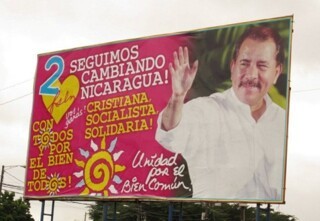Why Ortega Won
John Perry
Right-wing cynics were trying their best in the run up to Sunday’s election in Nicaragua. Foreseeing victory for the incumbent, President Daniel Ortega (he won with 62 per cent of the vote), they argued that at the least sign of electoral manipulation the United States should put its foot down. Robert Callahan, the US ambassador to Nicaragua from 2008 until July this year, proposed a four-point plan for the US to follow in the wake of likely electoral fraud. His suggestions included refusing to appoint a new ambassador and cutting off US aid.
US criticism of elections in developing countries is highly selective, but in any case Ortega has much less need to worry than he would have done a few years ago. The USA’s poor political reputation in Latin America under Bush has barely recovered under Obama, especially given his failure to condemn the coup d’état in Honduras. Ortega can keep up his anti-US rhetoric while knowing that the United States, Nicaragua’s biggest trading partner, won’t put any blocks on US business or tourism,which helped Nicaragua’s economy grow by 4.5 per cent last year. Ortega doesn’t need America’s strings-attached aid programmes.
Besides, he seems to have won cleanly and by a clear margin. Turnout was nearly 70 per cent: people have only had a democratic vote since 1984 and place a high value on it. I’ve just spoken to someone whose family made a costly overnight trip to vote in the remote village where they are registered. The big vote-winner was the government’s anti-poverty programmes: ‘Plan Roof’, ‘Zero Hunger’, ‘Zero Usury’, ‘Streets for the People’. Under Zero Hunger, women in rural areas are given a cow, a pig, hens and some basic help with looking after them. Many houses now exhibit new zinc roofs. Partly as a result, rural poverty fell by 5 per cent in 2010. Even the elite shouldn’t complain: most main roads are better than ever, and investment in electricity generation – some of it from renewable sources – means that extended power cuts are a thing of the past.
But they do complain, of course. The two main national newspapers have been unremitting in their criticism, and Ortega’s running for a second consecutive term produced dire warnings of an imminent‘dictatorship’. The social programmes and investment in infrastructure depend heavily on aid from other Latin American countries, especially Venezuela but also Cuba and Brazil. Ortega’s links with Hugo Chávez and Raúl Castro infuriate both Washington and Nicaragua’s US-oriented elite, but for most Nicaraguans they are a welcome alternative to dependency on US aid and the conditions that come with it. Nicaragua is the hemisphere’s second poorest country after Haiti. The anti-poverty programmes, combined with improved education and health services, and a growing economy, are seen as real achievements. It’s hardly surprising that people should vote for the party that has delivered them.

Comments